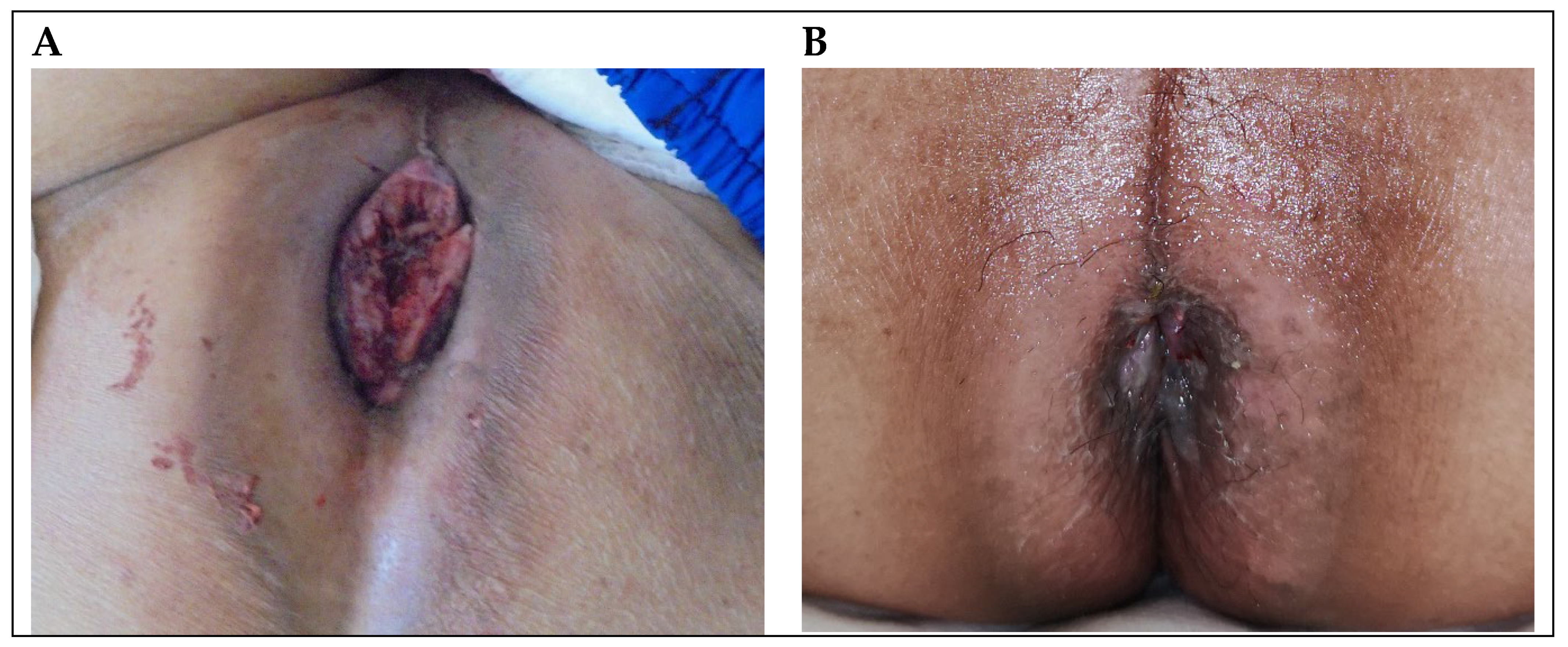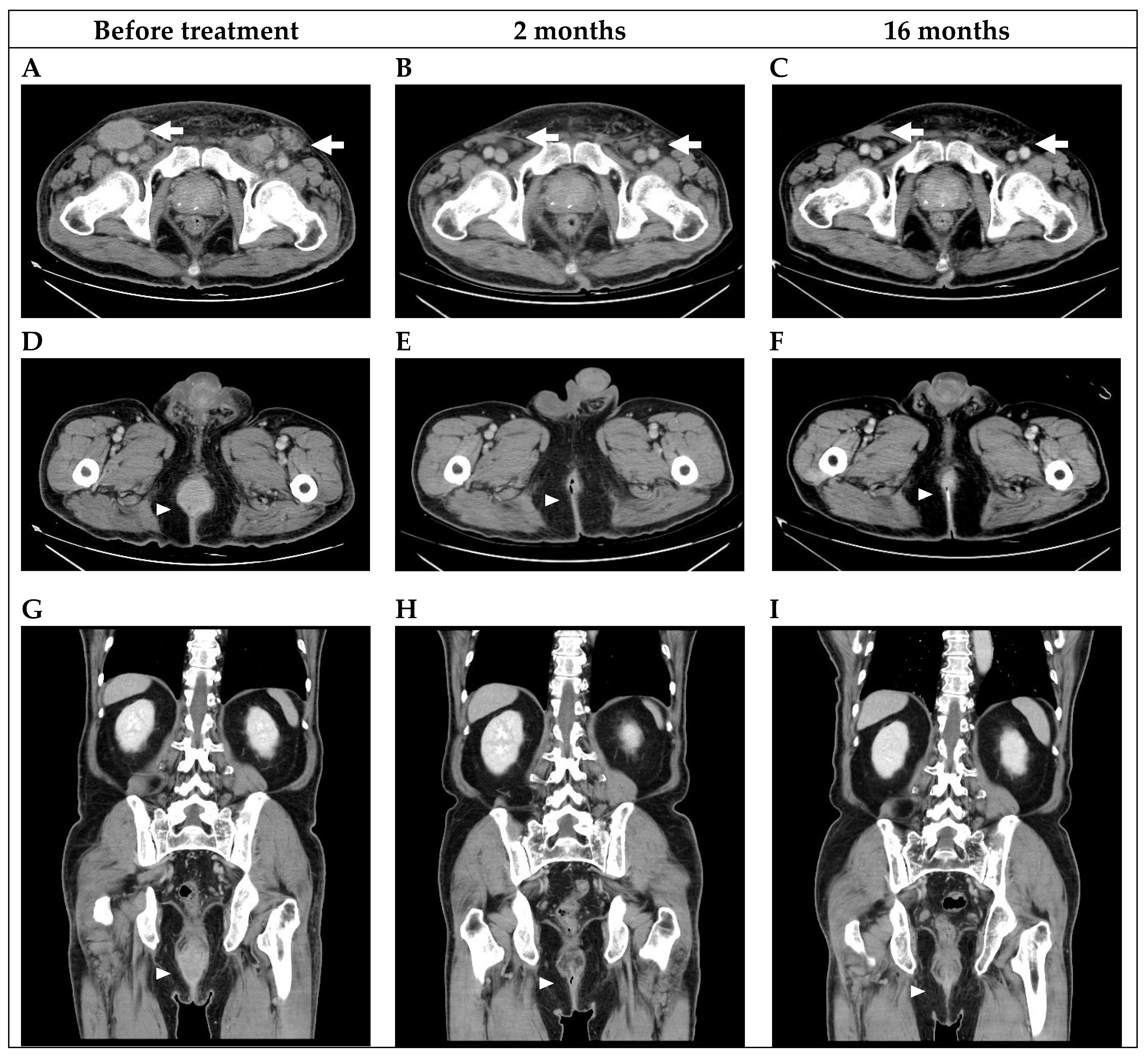Combination of Durvalumab and Chemotherapy to Potentially Convert Unresectable Stage IV Penile Squamous Cell Carcinoma to Resectable Disease: A Case Report
Abstract
1. Introduction
2. Case Presentation
3. Discussion
4. Conclusions
Author Contributions
Funding
Institutional Review Board Statement
Informed Consent Statement
Data Availability Statement
Conflicts of Interest
References
- Bray, F.; Ferlay, J.; Soerjomataram, I.; Siegel, R.L.; Torre, L.A.; Jemal, A. Global cancer statistics 2018: GLOBOCAN estimates of incidence and mortality worldwide for 36 cancers in 185 countries. CA Cancer J. Clin. 2018, 68, 394–424. [Google Scholar] [CrossRef]
- Ferlay, J.; Colombet, M.; Soerjomataram, I.; Mathers, C.; Parkin, D.M.; Piñeros, M.; Znaor, A.; Bray, F. Estimating the global cancer incidence and mortality in 2018: GLOBOCAN sources and methods. Int. J. Cancer 2019, 144, 1941–1953. [Google Scholar] [CrossRef] [PubMed]
- Backes, D.M.; Kurman, R.J.; Pimenta, J.M.; Smith, J.S. Systematic review of human papillomavirus prevalence in invasive penile cancer. Cancer Causes Control 2008, 20, 449–457. [Google Scholar] [CrossRef] [PubMed]
- Chaux, A.; Netto, G.J.; Rodríguez, I.M.; Barreto, J.E.; Oertell, J.; Ocampos, S.; Boggino, H.; Codas, R.; Bosch, F.X.; de Sanjose, S.; et al. Epidemiologic profile, sexual history, pathologic features, and human papillomavirus status of 103 patients with penile carcinoma. World J. Urol. 2011, 31, 861–867. [Google Scholar] [CrossRef] [PubMed]
- Parkin, D.M.; Bray, F. Chapter 2: The burden of HPV-related cancers. Vaccine 2006, 24 (Suppl. 3), S11–S25. [Google Scholar] [CrossRef]
- Hartwig, S.; Syrjänen, S.; Dominiak-Felden, G.; Brotons, M.; Castellsagué, X. Estimation of the epidemiological burden of human papillomavirus-related cancers and non-malignant diseases in men in Europe: A review. BMC Cancer 2012, 12, 30. [Google Scholar] [CrossRef]
- Skeppner, E.; Andersson, S.-O.; Johansson, J.-E.; Windahl, T. Initial symptoms and delay in patients with penile carcinoma. Scand. J. Urol. Nephrol. 2012, 46, 319–325. [Google Scholar] [CrossRef]
- Gao, W.; Song, L.-B.; Yang, J.; Song, N.-H.; Wu, X.-F.; Song, N.-J.; Qiao, D.; Chen, C.; Zhang, J.-Y.; Wang, Z.-J. Risk factors and negative consequences of patient’s delay for penile carcinoma. World J. Surg. Oncol. 2016, 14, 124. [Google Scholar] [CrossRef][Green Version]
- Ravi, R. Correlation between the Extent of Nodal Involvement and Survival following Groin Dissection for Carcinoma of the Penis. BJU Int. 1993, 72, 817–819. [Google Scholar] [CrossRef]
- Djajadiningrat, R.S.; Graafland, N.M.; van Werkhoven, E.; Meinhardt, W.; Bex, A.; van der Poel, H.G.; van Boven, H.H.; Olmos, R.A.V.; Horenblas, S. Contemporary Management of Regional Nodes in Penile Cancer—Improvement of Survival? J. Urol. 2014, 191, 68–73. [Google Scholar] [CrossRef]
- Di Lorenzo, G.; Buonerba, C.; Federico, P.; Perdonà, S.; Aieta, M.; Rescigno, P.; D’Aniello, C.; Puglia, L.; Petremolo, A.; Ferro, M.; et al. Cisplatin and 5-fluorouracil in inoperable, stage IV squamous cell carcinoma of the penis. BJU Int. 2012, 110, E661–E666. [Google Scholar] [CrossRef]
- Pagliaro, L.C.; Williams, D.L.; Daliani, D.; Williams, M.B.; Osai, W.; Kincaid, M.; Wen, S.; Thall, P.F.; Pettaway, C.A. Neoadjuvant Paclitaxel, Ifosfamide, and Cisplatin Chemotherapy for Metastatic Penile Cancer: A Phase II Study. J. Clin. Oncol. 2010, 28, 3851–3857. [Google Scholar] [CrossRef] [PubMed]
- Pettaway, C.A.; Pagliaro, L.; Theodore, C.; Haas, G. Treatment of Visceral, Unresectable, or Bulky/Unresectable Regional Metastases of Penile Cancer. Urology 2010, 76, S58–S65. [Google Scholar] [CrossRef] [PubMed]
- Lin, C.-C.; Guo, J.-C. Rational combination with an immunotherapy backbone in genitourinary cancers. Urol. Sci. 2020, 31, 4. [Google Scholar] [CrossRef]
- Trafalis, D.T.; Alifieris, K.; Kalantzis, A.; Verigos, K.E.; Vergadis, C.; Sauvage, S. Evidence for Efficacy of Treatment with the Anti-PD-1 Mab Nivolumab in Radiation and Multichemorefractory Advanced Penile Squamous Cell Carcinoma. J. Immunother. 2018, 41, 300–305. [Google Scholar] [CrossRef] [PubMed]
- Chahoud, J.; Skelton, W.P.I.; Spiess, P.E.; Walko, C.; Dhillon, J.; Gage, K.L.; Johnstone, P.A.S.; Jain, R.K. Case Report: Two Cases of Chemotherapy Refractory Metastatic Penile Squamous Cell Carcinoma with Extreme Durable Response to Pembrolizumab. Front. Oncol. 2020, 10, 615298. [Google Scholar] [CrossRef]
- Dou, W.-C.; Xu, J.; Liu, J.-Y.; Li, X. Neoadjuvant tislelizumab combination chemotherapy for advanced penile cancer: A case report. Asian J. Surg. 2022, 45, 968–969. [Google Scholar] [CrossRef]
- Mai, H.-Q.; Chen, Q.-Y.; Chen, D.; Hu, C.; Yang, K.; Wen, J.; Li, J.; Shi, Y.-R.; Jin, F.; Xu, R.; et al. Toripalimab or placebo plus chemotherapy as first-line treatment in advanced nasopharyngeal carcinoma: A multicenter randomized phase 3 trial. Nat. Med. 2021, 27, 1536–1543. [Google Scholar] [CrossRef]
- Yang, Y.; Qu, S.; Li, J.; Hu, C.; Xu, M.; Li, W.; Zhou, T.; Shen, L.; Wu, H.; Lang, J.; et al. Camrelizumab versus placebo in combination with gemcitabine and cisplatin as first-line treatment for recurrent or metastatic nasopharyngeal carcinoma (CAPTAIN-1st): A multicentre, randomised, double-blind, phase 3 trial. Lancet Oncol. 2021, 22, 1162–1174. [Google Scholar] [CrossRef]
- Colombo, N.; Dubot, C.; Lorusso, D.; Caceres, M.V.; Hasegawa, K.; Shapira-Frommer, R.; Tewari, K.S.; Salman, P.; Usta, E.H.; Yañez, E.; et al. Pembrolizumab for Persistent, Recurrent, or Metastatic Cervical Cancer. New Engl. J. Med. 2021, 385, 1856–1867. [Google Scholar] [CrossRef]
- De Bacco, M.W.; Carvalhal, G.F.; MacGregor, B.; Marçal, J.M.; Wagner, M.B.; Sonpavde, G.P.; Fay, A.P. PD-L1 and p16 Expression in Penile Squamous Cell Carcinoma from an Endemic Region. Clin. Genitourin. Cancer 2020, 18, e254–e259. [Google Scholar] [CrossRef] [PubMed]
- Udager, A.; Liu, T.-Y.; Skala, S.; Magers, M.; McDaniel, A.; Spratt, D.; Feng, F.; Siddiqui, J.; Cao, X.; Fields, K.; et al. Frequent PD-L1 expression in primary and metastatic penile squamous cell carcinoma: Potential opportunities for immunotherapeutic approaches. Ann. Oncol. 2016, 27, 1706–1712. [Google Scholar] [CrossRef] [PubMed]
- Patel, S.P.; Kurzrock, R. PD-L1 Expression as a Predictive Biomarker in Cancer Immunotherapy. Mol. Cancer Ther. 2015, 14, 847–856. [Google Scholar] [CrossRef] [PubMed]
- Gettinger, S.N.; Shepherd, F.A.; Antonia, S.J.; Brahmer, J.R.; Chow, L.Q.M.; Juergens, R.A.; Borghaei, H.; Shen, Y.; Harbison, C.; Alaparthy, S.; et al. First-line nivolumab (anti-PD-1; BMS-936558, ONO-4538) monotherapy in advanced NSCLC: Safety, efficacy, and correlation of outcomes with PD-L1 status. J. Clin. Oncol. 2014, 32, 8024. [Google Scholar] [CrossRef]
- McDermott, D.F.; Kluger, H.; Sznol, M.; Carvajal, R.; Lawrence, D.; Topalian, S.L.; Atkins, M.B.; Powderly, J.D.; Sharfman, W.H.; Puzanov, I.; et al. Long-Term Survival of Ipilimumab-Naïve Patients (Pts) with Advanced Melanoma (Mel) Treated with Nivolumab (Anti-Pd-1; Bms-936558, Ono-4538) in a Phase 1 Trial. Ann. Oncol. 2014, 25, iv375. [Google Scholar] [CrossRef][Green Version]
- Ottenhof, S.R.; Djajadiningrat, R.S.; De Jong, J.; Thygesen, H.H.; Horenblas, S.; Jordanova, E.S. Expression of Programmed Death Ligand 1 in Penile Cancer is of Prognostic Value and Associated with HPV Status. J. Urol. 2017, 197, 690–697. [Google Scholar] [CrossRef]
- Klempner, S.J.; Fabrizio, D.; Bane, S.; Reinhart, M.; Peoples, T.; Ali, S.M.; Sokol, E.S.; Frampton, G.; Schrock, A.B.; Anhorn, R.; et al. Tumor Mutational Burden as a Predictive Biomarker for Response to Immune Checkpoint Inhibitors: A Review of Current Evidence. Oncologist 2020, 25, e147–e159. [Google Scholar] [CrossRef]
- Marabelle, A.; Le, D.T.; Ascierto, P.A.; Di Giacomo, A.M.; De Jesus-Acosta, A.; Delord, J.-P.; Geva, R.; Gottfried, M.; Penel, N.; Hansen, A.R.; et al. Efficacy of Pembrolizumab in Patients with Noncolorectal High Microsatellite Instability/Mismatch Repair–Deficient Cancer: Results from the Phase II KEYNOTE-158 Study. J. Clin. Oncol. 2020, 38, 1–10. [Google Scholar] [CrossRef]
- Hahn, A.W.; Chahoud, J.; Campbell, M.T.; Karp, D.D.; Wang, J.; Stephen, B.; Tu, S.M.; Pettaway, C.A.; Naing, A. Pembrolizumab for advanced penile cancer: A case series from a phase II basket trial. Investig. New Drugs 2021, 39, 1405–1410. [Google Scholar] [CrossRef]
- McGregor, B.A.; Campbell, M.T.; Xie, W.; Farah, S.; Bilen, M.A.; Schmidt, A.L.; Sonpavde, G.P.; Kilbridge, K.L.; Choudhury, A.D.; Mortazavi, A.; et al. Results of a multicenter, phase 2 study of nivolumab and ipilimumab for patients with advanced rare genitourinary malignancies. Cancer 2021, 127, 840–849. [Google Scholar] [CrossRef]
- Vries, H.M.d.; Feijter, J.D.; Bekers, E.; Lopez-Yurda, M.; Pos, F.J.; Horenblas, S.; Jordanova, E.S.; Brouwer, O.R.; Schaake, E.E.; Heijden, M.S.V.D. Clinical results of PERICLES: A phase II trial investigating atezolizumab +/- radiotherapy for advanced squamous cell carcinoma of the penis. J. Clin. Oncol. 2022, 40, 3. [Google Scholar] [CrossRef]
- Subbiah, V.; Solit, D.B.; Chan, T.A.; Kurzrock, R. The FDA approval of pembrolizumab for adult and pediatric patients with tumor mutational burden (TMB) ≥10: A decision centered on empowering patients and their physicians. Ann. Oncol. 2020, 31, 1115–1118. [Google Scholar] [CrossRef] [PubMed]
- Bermejo, C.; Busby, J.E.; Spiess, P.E.; Heller, L.; Pagliaro, L.C.; Pettaway, C.A. Neoadjuvant chemotherapy followed by aggressive surgical consolidation for metastatic penile squamous cell carcinoma. J. Urol. 2007, 177, 1335–1338. [Google Scholar] [CrossRef] [PubMed]


| Study | Age | Staging | Treatment | Prior Treatment | Response | Duration of f/u | HPV | PD-L1 | MSI | TMB |
|---|---|---|---|---|---|---|---|---|---|---|
| Trafalis [15] | 47 | N/A | Nivolumab | Chemoradiation | PR | 9 months | Negative | Positive | Negative | High |
| Chahoud-1 [16] | 64 | TxN3M0 | Pembrolizumab | C/T+PLND+RT | CR | 38 months | Unknown | N/A | Ambiguous | High |
| Chahoud-2 [16] | 85 | TxpN3M0 | Pembrolizumab | Partial penectomy, chemotherapy, radiation | PR | 18 months | Negative | Positive | Negative | Low |
| Dou [17] | 32 | T3N3M0 | Tislelizumab+C/T | Nil | CR | 8 months | N/A | Positive | N/A | N/A |
Disclaimer/Publisher’s Note: The statements, opinions and data contained in all publications are solely those of the individual author(s) and contributor(s) and not of MDPI and/or the editor(s). MDPI and/or the editor(s) disclaim responsibility for any injury to people or property resulting from any ideas, methods, instructions or products referred to in the content. |
© 2022 by the authors. Licensee MDPI, Basel, Switzerland. This article is an open access article distributed under the terms and conditions of the Creative Commons Attribution (CC BY) license (https://creativecommons.org/licenses/by/4.0/).
Share and Cite
Chen, H.X.; Lin, C.-C.; Lin, C.-H.; Yang, C.-R. Combination of Durvalumab and Chemotherapy to Potentially Convert Unresectable Stage IV Penile Squamous Cell Carcinoma to Resectable Disease: A Case Report. Curr. Oncol. 2023, 30, 326-332. https://doi.org/10.3390/curroncol30010026
Chen HX, Lin C-C, Lin C-H, Yang C-R. Combination of Durvalumab and Chemotherapy to Potentially Convert Unresectable Stage IV Penile Squamous Cell Carcinoma to Resectable Disease: A Case Report. Current Oncology. 2023; 30(1):326-332. https://doi.org/10.3390/curroncol30010026
Chicago/Turabian StyleChen, Hao Xiang, Ching-Chan Lin, Che-Hung Lin, and Chi-Rei Yang. 2023. "Combination of Durvalumab and Chemotherapy to Potentially Convert Unresectable Stage IV Penile Squamous Cell Carcinoma to Resectable Disease: A Case Report" Current Oncology 30, no. 1: 326-332. https://doi.org/10.3390/curroncol30010026
APA StyleChen, H. X., Lin, C.-C., Lin, C.-H., & Yang, C.-R. (2023). Combination of Durvalumab and Chemotherapy to Potentially Convert Unresectable Stage IV Penile Squamous Cell Carcinoma to Resectable Disease: A Case Report. Current Oncology, 30(1), 326-332. https://doi.org/10.3390/curroncol30010026





